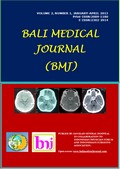INCREASE OF SERUM BCL-2 CONCENTRATION IN SEVERE HEAD INJURY: The Role of ACTH4-10Pro8Gly9Pro10 and HMG Co-A Reductase Inhibitor
Abstract
Objective: ACTH4-10Pro8Gly9Pro10 and HMG Co-A reductase inhibitor had a well-known neuroprotective effects. One important process happened in head injury is apoptotic neuronal death. Bcl-2 is one of anti-apoptotic protein inhibits the intrinsic pathway of apoptosis. This study aimed to compare the effect of standard therapy, ACTH4-10Pro8Gly9Pro10, and HMG Co-A reductase inhibitor on serum Bcl-2 levels and the potential effect to a better outcome and reduction of hospital stay. Method: Subjects of severe head injury without any indication for surgery were taken consecutively (n=60) and separated into three groups of; standard treatment only (control group), standard treatment combined with ACTH4-10Pro8Gly9Pro10, and standard treatment combined withInhibitor HMG CoA Reductase. Blood samples were taken on day-1 and day-5 from each subject for measurement of Bcl-2 concentration. Barthel index and MMSE were measured at discharge and hospital length of stay was noted. Results: Bcl-2 serum levels in control group was 1.49±1.01 ng/mL on day one and 1.64±0.61 ng/mL on day five; and 1.72±1.40 ng/mL on day one and 4.02±1.19 ng/mL on day five after treatment with ACTH4-10Pro8Gly9Pro10. In the HMG Co-A reductase inhibitor group, Bcl-2 serum level was 1.55±0.98ng/mL on day one and 2.00±0.90ng/mL on day five. The correlation of outcome (Barthel Index and MMSE) with serum Bcl-2 levels was not significant. We found the length of stay in the ACTH4-10Pro8Gly9Pro10 group was significantly shorter (p<0.05; CI 95%). Conclusion: ACTH4-10Pro8Gly9Pro10 significantly increased serum Bcl-2 concentration in head injury. Although we didn’t find any correlation between serum Bcl-2and outcome (Barthel Index and MMSE), therapy with ACTH4-10Pro8Gly9Pro10 resulted in a significantly shorter hospital length of stay.


